In the twilight of the fading day the sun descends over the Saints Cosmas and Damian Monastery near the village of Gigintsi. Just before it dips behind the mountain, the buildings clustered around the old church start glowing pink and purple. At that precise moment when time seems to be holding its breath, a monotonous chant rises from the monastery. Evening service has begun, this time without priest Nicanor. The monk was detained in the nearby village where he was working and is now hurrying back to the monastery in time for dinner. Rules in the isolated monastery are strict and every action and thought of the handful of inhabitants is subject to the will of God and in the service of the people.
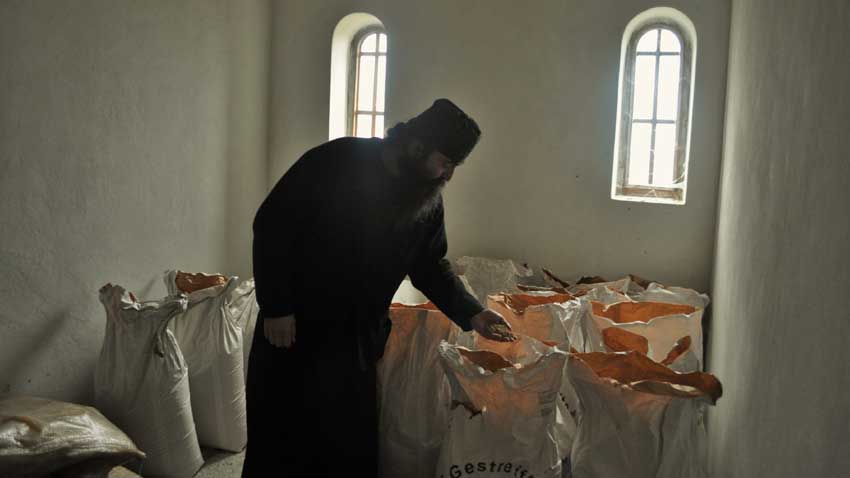
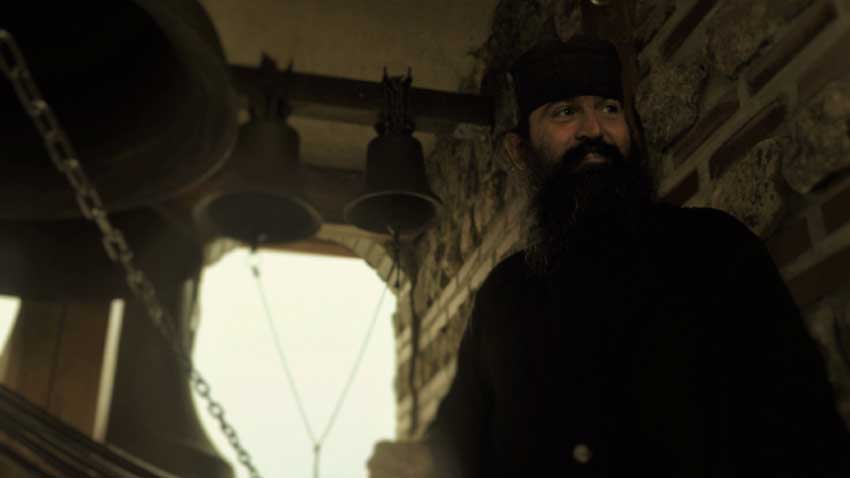 "Living as a monk is a mystery of sorts, the mystery of salvation. It cannot be explained in words, you have to live it!" This is the answer monk Nicanor gives to the question why he abandoned a dazzling career as a Wall Street broker to seek the path to God here. The dining room is warm and cozy and the bread we eat melts in the mouth. The monastery often gives shelter to pilgrims and casual tourists. There is no TV, no Internet or diversions. Spending the night in the modest cells and having a delicious home-made dinner is free, but if one decides to stay on for more than a day, they will have to work hard in the monastery farm. This is a way to see the primitive way of life of the monks up close. Monk Nicanor remembers with nostalgia that when he arrived, there was not even electricity in the monastery, not to mention hot water or heating. Life in this monastery is harsh because monks live according to the same rules as the brotherhood in Mount Athos.
"Living as a monk is a mystery of sorts, the mystery of salvation. It cannot be explained in words, you have to live it!" This is the answer monk Nicanor gives to the question why he abandoned a dazzling career as a Wall Street broker to seek the path to God here. The dining room is warm and cozy and the bread we eat melts in the mouth. The monastery often gives shelter to pilgrims and casual tourists. There is no TV, no Internet or diversions. Spending the night in the modest cells and having a delicious home-made dinner is free, but if one decides to stay on for more than a day, they will have to work hard in the monastery farm. This is a way to see the primitive way of life of the monks up close. Monk Nicanor remembers with nostalgia that when he arrived, there was not even electricity in the monastery, not to mention hot water or heating. Life in this monastery is harsh because monks live according to the same rules as the brotherhood in Mount Athos.
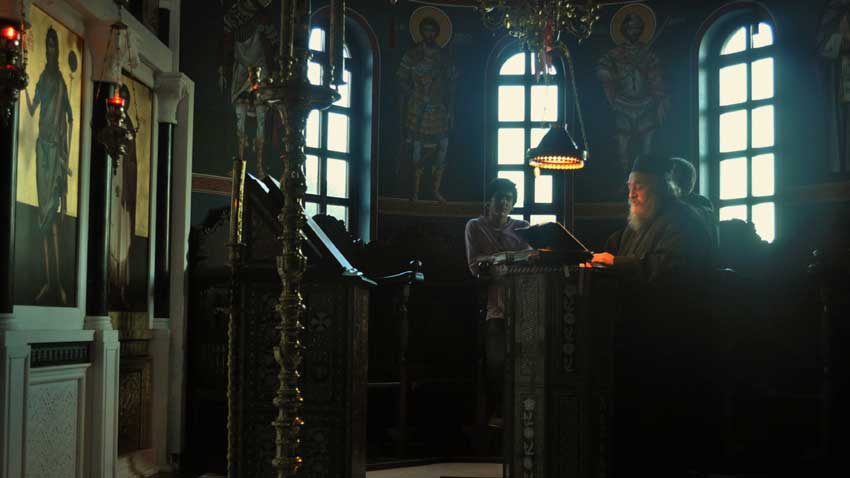
"They have to do with the fact that prayer should be delivered at a time that is best for the soul. When is this time? It is when the soul is detached from the thoughts of care and daily vanity - in the evening when one gets ready to sleep and then about 3 a.m., before sunrise. So the night is divided into two parts – we take a rest during the first half and pray during the second. We should finish with the liturgy no later than 8:30 because daily cares for this place and the people who come here start with rise of the sun. "
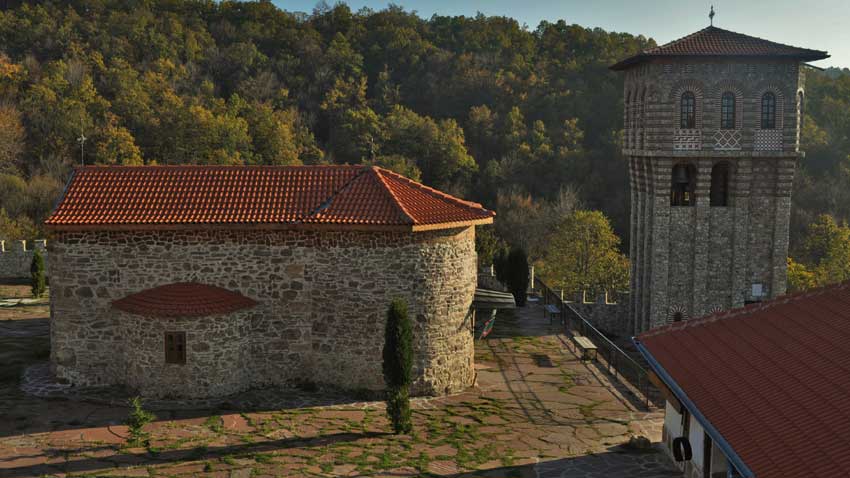
After the 4-hour-long night liturgy the monks start their work. In their farm they have goats, sheep and 90 buffaloes. The monks make cheese and other dairy delicacies sold in the small monastery shop. Thanks to European funding and donations repair works are underway and the old church is being restored. A new one is also being built, as well as a bell tower.
The monastery has a history goinf back centuries. Nicanor told us that it was founded in the 11-12 century. During the Ottoman rule a school was housed here. In the 18th century, the monastery was destroyed by the Turks to be later restored thanks to a group of monks from the Hilendar monastery on Mount Athos. With the help of local priests the old farm buildings and the church were built. In the first years of the socialist era, enemies of the “people’s power” were imprisoned in the monastery, which was later transformed into a children’s camp. At one point the crumbling monastery complex was used as a barn. It was only in the late 1990s that the spiritual activity of the monastery was restored. Gradually the monastery awoke to a new life, becoming a beautiful place for solitude, a place to seek the road to your own self and to God.
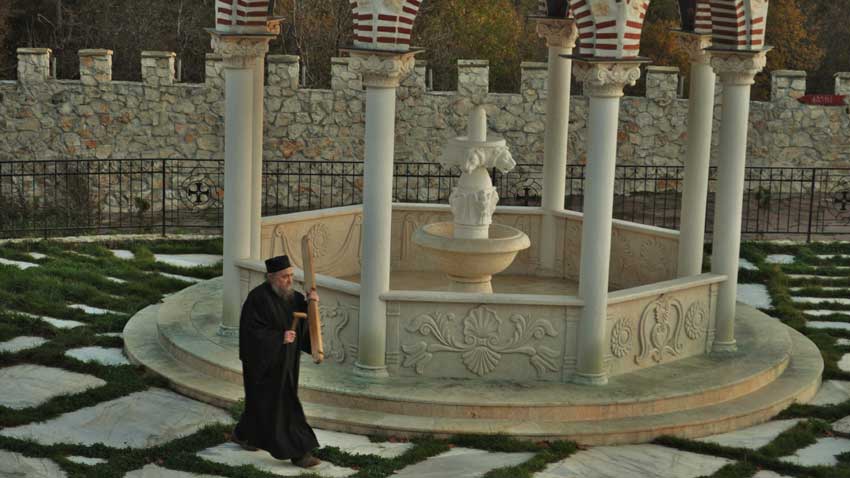
Photos: Veneta Nikolova
English: Alexander Markov
This article is prepared with the assistance of the project “Communication campaign to promote domestic tourism in Bulgaria" of the Ministry of the Economy and EnergyThe Yantra River rises in the Balkan Mountains at 1,220 metres above sea level and descends northwards, meandering through picturesque valleys and gorges in central northern Bulgaria, crossing the towns of Gabrovo and Veliko Tarnovo. Shortly before it..
The village of Momchilovtsi, the Rhodopes, Pamporovo and the Smolyan region were present with a pavilion at a tourism exhibition this autumn in Ningbo, China. Speaking to BTA, Momchil Karaivanov, a representative of the Bulgarian-Chinese Society..
Cultural tourism accounts for nearly 20 % of the country’s tourism product, according to data from a survey by the Ministry of Tourism. While Bulgaria's image was previously associated mainly with maritime tourism, which made up 70% of the tourism..

+359 2 9336 661
